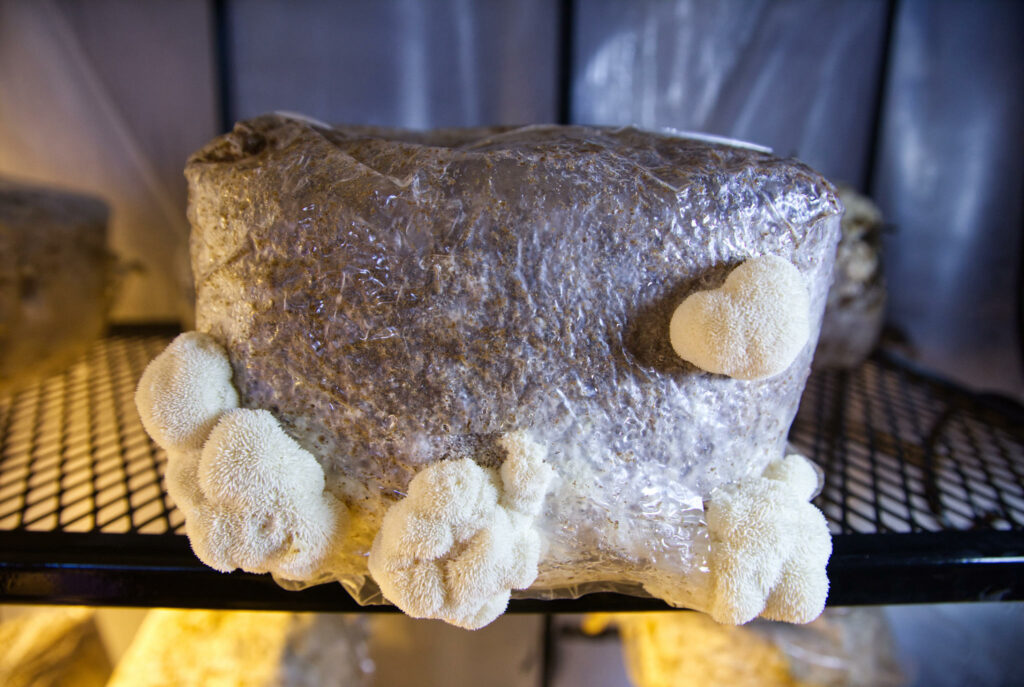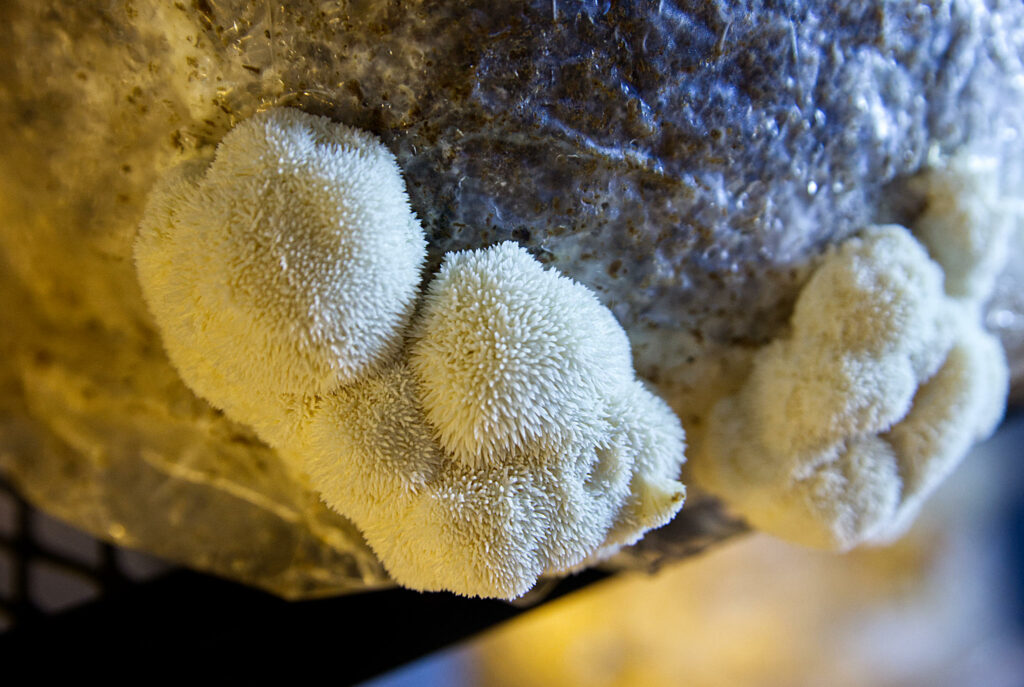
If you want to learn about lion’s mane benefits you’ve come to the right place. Lion’s mane mushrooms have been used for centuries in Eastern medicine, and modern studies have shown impressive results from using this mushroom. Uses include brain health, cancer prevention, and a host of other health reasons. Let’s take a look and find out what lion’s mane mushroom is, where to find it, how it is used, and the things it is used for. Besides being a useful mushroom to consume for health reasons it has a taste and consistency very much like shrimp or crab meat. If you love seafood this is a vegetarian alternative you can try.
What Is Lion’s Mane Mushroom?
Lion’s mane (Hericium erinaceus) is a mushroom that belongs to the tooth fungus family of mushrooms. It is white to off-white in color with spines that can reach over 1 cm long. The spines, when fully mature, make this mushroom appear similar to the mane of a lion. This is where the common name comes from. It is also called hedgehog mushroom, bearded hedgehog, bearded tooth, or mountain-priest mushroom. In Japan, it is known as Yamabushitake, and in China, it is known as Hou Tou Gu.
These mushrooms are a native species to North America, Europe, and Asia. They are widely cultivated in Asia, but only sparsely grown in the United States. This seems to be changing in the US as more people learn about this great-tasting mushroom for culinary and medicinal uses.
They can be found in the wild, usually in the late Fall and early winter. Look for dead or dying hardwood trees and you may get lucky and find them in the wild. At Lost In The Ozarks, we are beginning to grow a commercial strain so we will be able to offer them for sale soon. If you are interested in purchasing when they become available send us an e-mail for details.
Lion’s Mane Benefits For Health
Benefits for The Brain
The benefits of lion’s mane mushrooms that have been most extensively studied are for brain and nerve health and function. Numerous studies have found that extracts from this mushroom can regenerate peripheral nerves after injuries. You can read about some of those animal studies here and in this study. These studies show promise in identifying the substances responsible for the neuroregenerative properties.
Another of the many lion’s mane mushroom benefits is in the regeneration of the brain, spinal cord, and retinal cells. The study showed the regeneration of cells in the lab, and delayed cell death when treated with the mushroom extract. Neurite outgrowth was observed to increase in a laboratory cell line by around 20% in the treated cells. This has enormous potential for discovering a treatment for Alzheimer’s and Parkinson’s diseases.
Another study confirmed the neuroprotective effects of lion’s mane mushroom in a cell line developed to test Alzheimer’s disease treatments. The study found that it may also modulate neurotransmitters in the brain.
One human clinical trial found improvement in subjects with mild cognitive impairment treated for 8-16 weeks with an extract from lion’s mane mushroom. The study did note that the effects did not last once the treatments were discontinued.
Another human randomized, double-blind, placebo-controlled study found that oral intake of lion’s mane significantly improved cognitive function in a 12-week trial.
With all the promising research this is one medicinal mushroom you might want to add to your diet as part of a plan to help diminish your chances of developing cognitive impairment as you age.
Possibly Helps to Prevent and Treat Cancers
There exists another body of research that suggests that the intake of lion’s mane mushrooms may help to prevent or slow the spread of some cancers. The research has shown promising results with stomach, lung, liver, colon, breast, and cervical cancers, as well as leukemia.
Although the research has been conducted in lab and animal studies, the results are promising. Hopefully, these studies will lead to human studies that further demonstrate that anti-cancer properties are another of the many lion’s mane benefits.
May Help Reduce Inflammation
A Japanese study demonstrated the anti-inflammatory effects of lion’s mane on the low-level chronic inflammation of fatty tissues in obesity. This chronic inflammation is believed to contribute to metabolic syndrome in the obese population.
Metabolic syndrome is described as having a set of conditions that put an individual at risk for heart disease, Type-2 diabetes, and stroke. The conditions include high blood pressure, high cholesterol or triglycerides, increased blood sugar levels, and excess body fat in the waist area.

May Improve the Health of the Digestive Tract
The anti-inflammatory properties of these mushrooms may help to improve the health of the digestive tract. In addition to its role in possibly preventing stomach and colon cancer, lion’s mane has also been shown to help prevent and heal gastric ulcers, inhibit the H. pylori bacteria, and may help with gastritis and inflammatory bowel disease.
Contains Powerful Antioxidants
Some of the naturally produced chemical constituents of lion’s mane mushrooms have been shown in lab and animal studies to contain powerful antioxidant effects. One study in Malaysia found that an extraction made from lion’s mane helped to speed up wound healing in rats.
It may also help slow skin aging, protect against osteoporosis, and protect the liver from alcohol-induced damage.
Conclusion
As you can see, there are plenty of reasons to consider using this amazing mushroom to receive all the lion’s mane benefits as discussed above. As further research is conducted we may very well find additional uses for this amazing fungi. In addition to all the benefits described, it is also worth noting that cooked lion’s mane mushroom has been described as having a taste and consistency similar to shrimp, crab, or lobster.
Be sure and check out our article on the benefits of consuming oyster mushrooms too.
Be sure and check out all the informative articles on our Natural Living Blog.
FAQs:
Q: What is Lion’s Mane Mushroom?
A: It is a type of edible mushroom that is native to Asia, Europe, and North America. It is also known as Hericium erinaceus or Yamabushitake and is characterized by its long, shaggy spines that resemble a lion’s mane.
Q: What are the benefits of Lion’s Mane Mushroom for health?
A: It has several potential health benefits, including benefits for the brain, possible prevention and treatment of cancers, reduction of inflammation, improvement of digestive tract health, and the presence of powerful antioxidants.
Q: What are the benefits of Lion’s Mane Mushroom for the brain?
A: It may help to enhance cognitive function, improve memory, and promote nerve growth in the brain. It may also have potential benefits for reducing the risk of neurodegenerative diseases such as Alzheimer’s and Parkinson’s.
Q: How can Lion’s Mane Mushroom possibly help to prevent and treat cancers?
A: It contains compounds that have been found to have anti-tumor properties. These compounds may help to prevent the growth and spread of cancer cells and improve the effectiveness of chemotherapy.
Q: How can Lion’s Mane Mushroom help to reduce inflammation?
A: It contains anti-inflammatory compounds that may help to reduce inflammation in the body. This could potentially lead to a reduction in the risk of chronic diseases such as heart disease, diabetes, and certain types of cancer.
Q: How can Lion’s Mane Mushroom improve the health of the digestive tract?
A: It may help to promote the growth of beneficial gut bacteria, which can improve digestive function and reduce the risk of certain digestive disorders such as inflammatory bowel disease.
Q: What are the powerful antioxidants present in Lion’s Mane Mushroom?
A: It contains several antioxidants, including ergothioneine and polysaccharides. These antioxidants may help to protect against cellular damage and reduce the risk of chronic diseases such as heart disease and cancer.